Matthew 2:22 But when he heard that Archelaus did reign in Judaea in the room of his father Herod, he was afraid to go thither: notwithstanding, being warned of God in a dream, he turned aside into the parts of Galilee: - Free Bible Online
Matthew 2:22 But when he heard that Archelaus was reigning over Judea in place of his father Herod, he was afraid to go there. And being warned [by God] in a dream, he departed for the regions of Galilee,
22. But when he heard that Archelaus did reign in Judea in the room of
his father Herod--Archelaus succeeded to Judea, Samaria, and Idumea;
but Augustus refused him the title of king till it should be seen
how he conducted himself; giving him only the title of ethnarch
[JOSEPHUS, Antiquities, 17.11,4]. Above this,
however, he never rose.
The people, indeed, recognized him as his father's successor; and so it
is here said that he "reigned in the room of his father Herod." But,
after ten years' defiance of the Jewish law and cruel tyranny, the
people lodged heavy complaints against him, and the emperor banished him
to Vienne in Gaul, reducing Judea again to a Roman province. Then the
"scepter" clean "departed from Judah."
he was afraid to go thither--and no wonder, for the reason just
mentioned.
notwithstanding--or more simply, "but."
being warned of God in a dream, he turned aside--withdrew.
into the parts of Galilee--or the Galilean parts. The whole
country west of the Jordan was at this time, as is well known, divided
into three provinces--GALILEE being the northern,
JUDEA the southern, and SAMARIA the central province. The province of Galilee was
under the jurisdiction of Herod Antipas, the brother of Archelaus, his
father having left him that and Perea, on the east side of the Jordan,
as his share of the kingdom, with the title of tetrarch, which
Augustus confirmed. Though crafty and licentious, according to JOSEPHUS--precisely what the Gospel history shows him to
be (see on
Mr 6:14-30;
Lu 13:31-35)
--he was of a less cruel disposition than Archelaus; and Nazareth being
a good way off from the seat of government, and considerably secluded,
it was safer to settle there.
JFB.
Questions Related to this Verse
Select a Chapter
-
Matthew 1 |
Matthew 2 |
Matthew 3 |
Matthew 4 |
Matthew 5 |
Matthew 6 |
Matthew 7 |
Matthew 8 |
Matthew 9 |
Matthew 10 |
Matthew 11 |
Matthew 12 |
Matthew 13 |
Matthew 14 |
Matthew 15 |
Matthew 16 |
Matthew 17 |
Matthew 18 |
Matthew 19 |
Matthew 20 |
Matthew 21 |
Matthew 22 |
Matthew 23 |
Matthew 24 |
Matthew 25 |
Matthew 26 |
Matthew 27 |
Matthew 28 |
Select a Book of the Bible
-
Genesis |
Exodus |
Leviticus |
Numbers |
Deuteronomy |
Joshua |
Judges |
Ruth |
1 Samuel |
2 Samuel |
1 Kings |
2 Kings |
1 Chronicles |
2 Chronicles |
Ezra |
Nehemiah |
Esther |
Job |
Psalms |
Proverbs |
Ecclesiastes |
Song of Solomon |
Isaiah |
Jeremiah |
Lamentations |
Ezekiel |
Daniel |
Hosea |
Joel |
Amos |
Obadiah |
Jonah |
Micah |
Nahum |
Habakkuk |
Zephaniah |
Haggai |
Zechariah |
Malachi |
Matthew |
Mark |
Luke |
John |
Acts |
Romans |
1 Corinthians |
2 Corinthians |
Galatians |
Ephesians |
Philippians |
Colossians |
1 Thessalonians |
2 Thessalonians |
1 Timothy |
2 Timothy |
Titus |
Philemon |
Hebrews |
James |
1 Peter |
2 Peter |
1 John |
2 John |
3 John |
Jude |
Revelation |
Brief Summary: Matthew chapter two covers the visit of the Wise Men, Joseph and Mary's flight to Egypt with Jesus, the slaughter of the infants in Bethlehem, and Joseph and Mary's return from Egypt to Nazareth.
Detailed Summary: Matthew chapter two confirms the birth of Jesus in Bethlehem of Judaea, and that it was during the time that Herod the Great was ruling as king in Jerusalem. Wise Men (Magi) came from the east to Jerusalem inquiring about where the king of the Jews was who had just been born in Jerusalem. Herod was very troubled by this statement and so was the city of Jerusalem. He called in the chief priests and scribes demanding to know where the Messiah was to be born according to the Jewish beliefs. They responded Bethlehem and quoted to him the prophecy of Micah 5:2 in the Jewish Scriptures. Herod called the wise men in asking exactly when the star had appeared. He sent them to Bethlehem and told them to let him know when they find him so he can come worship him also. When they left Jerusalem they came to Bethlehem and once again saw the star which they had seen in the east and they became very excited and rejoiced. The star went before them and guided them to the house where the child was and stood over the child. They entered the house and saw the child with Mary His mother, and they fell down and worshipped Him. They opened their treasures and presented to him gold, and frankincense, and myrrh. When they departed they left for their own country another way because they were warned in a dream not to return to king Herod. The angel of the Lord also warned Joseph to depart for Egypt until it is safe because Herod will seek out the child to kill Him. They departed that very night for Egypt, and they remained there in Egypt until Herod had died. Matthew attributes this temporary sojourn in Egypt as a direct fulfillment of prophecy. When Herod found out that the wise men had departed secretly he was enraged, and he ordered the slaughter of all infants 2 years and under in Bethlehem and along the coasts. Matthew also attributes this event to the words of the prophet Jeremiah. Once king Herod had finally died the Lord revealed to Joseph that it was safe to return to the land of Israel. The Lord also warned Joseph about Herod's son Archelaus and they brought Jesus to a city in the area of Galilee called Nazareth. Matthew also attributes this to the word of the prophets.
Key Concept: Jesus was the virgin born king by royal descent and Son of God with no human father by blood (Matthew 1:18)
Key Verses:
![]() Matthew 2:1-2 Now when Jesus was born in Bethlehem of Judaea in
the days of Herod the king, behold, there came wise men from the
east to Jerusalem, Saying, Where is he that is born King of the
Jews? for we have seen his star in the east, and are come to
worship him.
Matthew 2:1-2 Now when Jesus was born in Bethlehem of Judaea in
the days of Herod the king, behold, there came wise men from the
east to Jerusalem, Saying, Where is he that is born King of the
Jews? for we have seen his star in the east, and are come to
worship him.
![]() Matthew 2:9 When they had heard the king, they departed; and,
lo, the star, which they saw in the east, went before them, till
it came and stood over where the young child was.
Matthew 2:9 When they had heard the king, they departed; and,
lo, the star, which they saw in the east, went before them, till
it came and stood over where the young child was.
![]() Matthew 2:11 And when they were come into the house, they saw
the young child with Mary his mother, and fell down, and
worshipped him: and when they had opened their treasures, they
presented unto him gifts; gold, and frankincense, and myrrh.
Matthew 2:11 And when they were come into the house, they saw
the young child with Mary his mother, and fell down, and
worshipped him: and when they had opened their treasures, they
presented unto him gifts; gold, and frankincense, and myrrh.
![]() Matthew 2:23 And he came and dwelt in a city called Nazareth.
Matthew 2:23 And he came and dwelt in a city called Nazareth.
Important Related Verses:
![]() Numbers 24:17 I shall see him, but not now: I shall behold him,
but not nigh: there shall come a Star out of Jacob, and a
Sceptre shall rise out of Israel, and shall smite the corners of
Moab, and destroy all the children of Sheth.
Numbers 24:17 I shall see him, but not now: I shall behold him,
but not nigh: there shall come a Star out of Jacob, and a
Sceptre shall rise out of Israel, and shall smite the corners of
Moab, and destroy all the children of Sheth.
![]() Isaiah 11:1-2 And there shall come forth a rod out of the stem
of Jesse, and a Branch shall grow out of his roots: And the
spirit of the LORD shall rest upon him.
Isaiah 11:1-2 And there shall come forth a rod out of the stem
of Jesse, and a Branch shall grow out of his roots: And the
spirit of the LORD shall rest upon him.
![]() Jeremiah 23:5 Behold, the days come, saith the LORD, that I will
raise unto David a righteous Branch, and a King shall reign and
prosper, and shall execute judgment and justice in the earth.
Jeremiah 23:5 Behold, the days come, saith the LORD, that I will
raise unto David a righteous Branch, and a King shall reign and
prosper, and shall execute judgment and justice in the earth.
Interesting Notes:
![]() Of the Gospel writers only Matthew records the genealogy of
Jesus through Joseph, the visit of the Magi, the flight into
Egypt, and the murder of the infants.
Of the Gospel writers only Matthew records the genealogy of
Jesus through Joseph, the visit of the Magi, the flight into
Egypt, and the murder of the infants.
![]() Matthew mentions the wise men but does not mention how many, and
out of their treasures they gave to him three gifts: gold, and
frankincense, and myrrh.
Matthew mentions the wise men but does not mention how many, and
out of their treasures they gave to him three gifts: gold, and
frankincense, and myrrh.
![]() Jesus could have been anywhere from 40 days to 2 years old when
the magi came to worship Him.
Jesus could have been anywhere from 40 days to 2 years old when
the magi came to worship Him.
![]() The meaning of the gold, and frankincense, and myrrh is
reasonably certain. In the ancient Hebrew traditions gold spoke
of deity, incense was associated with worship, and myrrh was
associated with death.
The meaning of the gold, and frankincense, and myrrh is
reasonably certain. In the ancient Hebrew traditions gold spoke
of deity, incense was associated with worship, and myrrh was
associated with death.
![]() Matthew records that the wise men presented the gifts of gold,
and frankincense, and myrrh out of their treasures.
Matthew records that the wise men presented the gifts of gold,
and frankincense, and myrrh out of their treasures.
![]() The wise men fell down and worshipped Jesus as deity. The Bible
is clear that you shall worship the LORD your God only and Him
only shall you serve.
The wise men fell down and worshipped Jesus as deity. The Bible
is clear that you shall worship the LORD your God only and Him
only shall you serve.
![]() The wise men did not follow a star but the star that appeared to
them in the east reappeared in Bethlehem and led them to the
house and stood over where the child was.
The wise men did not follow a star but the star that appeared to
them in the east reappeared in Bethlehem and led them to the
house and stood over where the child was.
![]() Matthew records that Jesus was no longer in a manger but in a
house.
Matthew records that Jesus was no longer in a manger but in a
house.
![]() Matthew does not indicate that the Magi were kings or where they were from, it only
says, "the east."
Matthew does not indicate that the Magi were kings or where they were from, it only
says, "the east."
![]() It is interesting that after the 70 year Babylonian captivity
when the Persian leader Cyrus gave the decree for the Jews to
return and rebuild their Temple that only few Jews actually
returned from Babylon.
It is interesting that after the 70 year Babylonian captivity
when the Persian leader Cyrus gave the decree for the Jews to
return and rebuild their Temple that only few Jews actually
returned from Babylon.
![]() Many in Israel were expecting the Messiah to come because of the
prophecy of Daniel about the 70 weeks.
Many in Israel were expecting the Messiah to come because of the
prophecy of Daniel about the 70 weeks.
![]() There is no indication where they journeyed to in the land of
Egypt.
There is no indication where they journeyed to in the land of
Egypt.
![]() There is no historical evidence whatsoever of Jesus in Egypt or
what happened while Joseph, Mary, and Jesus were there.
There is no historical evidence whatsoever of Jesus in Egypt or
what happened while Joseph, Mary, and Jesus were there.
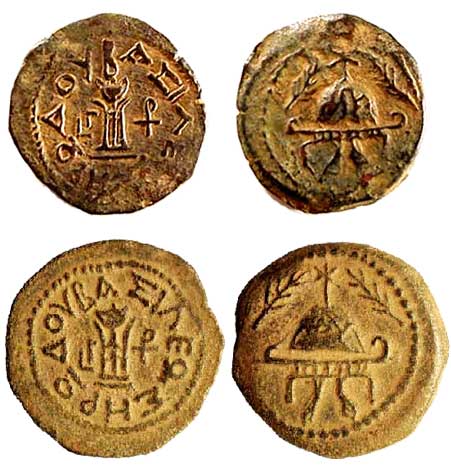
37 BC Coins Mentioning King Herod
These coins are among the proof that the
Biblical King Herod the Great was a factual person in history.
King Herod I (The Great)
Herod was the name
of several men of the royal dynasty which
originated in Edom or Idumea after it had been
forced to adopt the Jewish religion by John Hyrcanus
in 125 B.C. This family ruled in Israel as
vassals of Rome. The history of this dynasty,
which succeeded that of the Maccabees, largely
relates to the political history of Israel during
this whole period.
Herod I (the Great) was son of Antipater and
made king by the Romans in 40 B.C. He managed to
keep hold of his throne in the face of the many
changes in the government at Rome.
His kingdom comprised Judea, Samaria, Galilee,
Idumea, Batanea, and Peraea, which was approximately
the same size as the kingdom of David and Solomon.
Although Herod had exceptional leadership skills, he
was extremely disliked by the Jews. His attitude
toward the Maccabean dynasty, to which he was
related by marriage, along with his insolence and
cruelty, angered them all the more. He even had his
brother-in-law and several of his wives and sons
executed.
He forced heavy taxes and brutally repressed any
rebellions. But it was by his policy of Hellenistic
culture that he greatly wounded the Jews. The
construction of a race-course, a theater, and an
amphitheater in Jerusalem, his wide support of the
emperor cult in the East, and the construction of
pagan temples in foreign cities at his own expense
could not be forgiven, even though he restored and
reconstructed the Temple of Jerusalem and
continually pleaded the cause of the Jews of the
Diaspora to the emperor to his own gains.
There was no close tie between the king and his
people; he remained an Edomite and a friend of Rome,
only holding on to his power by the use of a
merciless military force. This is the same Herod the
Great who massacred the children of Bethlehem (Matt.
2).
Herod suddenly died in 4 BC. After his death, the
Emperor Augustus made three of Herod?s sons the
rulers of different parts of their father's kingdom.
Herod's son, Archelaus (Matt. 2), obtained Judea
and Samaria. He was a tyrant like his father and
lacked his fathers ambition and talent. He irritated
the Jews and Samaritans so intensely that Augustus
deposed him in 6 A.D. and placed a Roman procurator
over his kingdom.
Herod's other
sons were Antipas, Philip, Agrippa I, and Agrippa
II. After Agrippa II died the Herodian
dynasty disappeared from the stage of history.
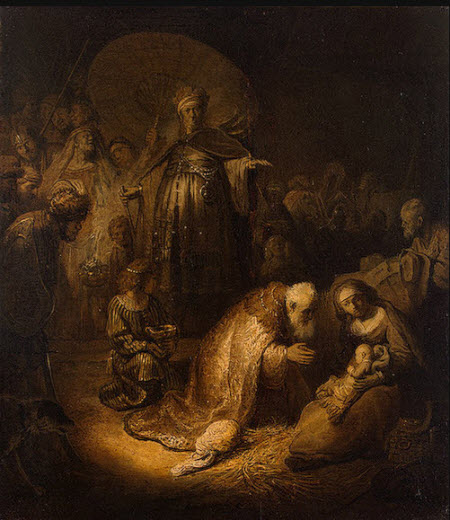
Adoration of the Magi, by Rembrandt
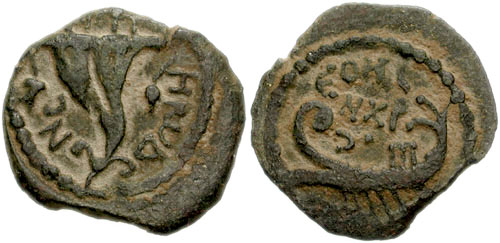
4 AD Coin of Archelaus
This is an image of a Jerusalem minted coin
of Archelaus, the Herodian king of Judea.
See
Wikipedia Article
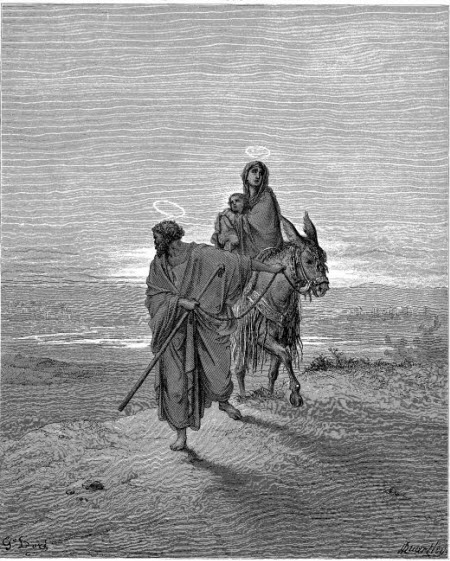
The Flight Into Egypt Painting by
Gustave Dore
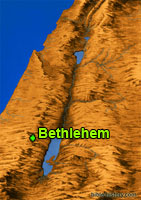
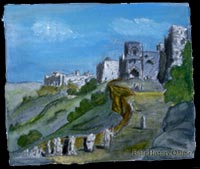

Bethlehem
BETH'LEHEM "House
of Bread" (BETH'LECHEM)
Bethlehem is about five miles S of Jerusalem, and
elevated 2,460 feet above sea level.
There was much history in this little town. Rachel
died and was buried here. Boaz and Ruth were wedded
and dwelt in Bethlehem. David was born in Bethlehem,
and here he was anointed as future king by Samuel (1
Sam 16:1); here was the well from which David's
three heroes brought him water (2 Sam 23:15-16), it
was the birthplace of the Messiah (Mic 5:2 Mt 2:1),
and its male children were slain by order of Herod
(Mt 2:16, Jer 31:15).
It was originally called Ephrath
In Bethlehem today stands the Basilica of the
Nativity, marking the traditional site of the birth
of Christ.
Painting of the Massacre of the Innocents by Nicolas Poussin.
Bibliography Information
Free Bible Online Picture Study Bible, King James Version. New York: American Bible Society: www.free-bible.com, 1995-2013. Bible History Picture Study Bible. Jan 13, 2026.
- King James Bible Home
- Free Bible Home Page
- Bible Encyclopedia (ISBE)
- Online Bible (KJV)
- Naves Topical Bible
- Smith's Bible Dictionary
- Easton's Bible Dictionary
- Fausset's Bible Dictionary
- Matthew Henry Bible Commentary
- Hitchcock's Bible Dictionary
Read The Bible
- 1599 Geneva Bible (GNV)
- 21st Century King James Version (KJ21)
- American Standard Version (ASV)
- Amplified Bible (AMP)
- Amplified Bible, Classic Edition (AMPC)
- Authorized (King James) Version (AKJV)
- BRG Bible (BRG)
- Christian Standard Bible (CSB)
- Common English Bible (CEB)
- Complete Jewish Bible (CJB)
- Contemporary English Version (CEV)
- Darby Translation (DARBY)
- Disciples’ Literal New Testament (DLNT)
- Douay-Rheims 1899 American Edition (DRA)
- Easy-to-Read Version (ERV)
- English Standard Version (ESV)
- English Standard Version Anglicised (ESVUK)
- Evangelical Heritage Version (EHV)
- Expanded Bible (EXB)
- GOD’S WORD Translation (GW)
- Good News Translation (GNT)
- Holman Christian Standard Bible (HCSB)
- International Children’s Bible (ICB)
- International Standard Version (ISV)
- J.B. Phillips New Testament (PHILLIPS)
- Jubilee Bible 2000 (JUB)
- King James Version (KJV)
- Lexham English Bible (LEB)
- Living Bible (TLB)
- Modern English Version (MEV)
- Mounce Reverse Interlinear New Testament (MOUNCE)
- Names of God Bible (NOG)
- New American Bible (Revised Edition) (NABRE)
- New American Standard Bible (NASB)
- New American Standard Bible 1995 (NASB1995)
- New Catholic Bible (NCB)
- New Century Version (NCV)
- New English Translation (NET)
- New International Reader's Version (NIRV)
- New International Version - UK (NIVUK)
- New International Version (NIV)
- New King James Version (NKJV)
- New Life Version (NLV)
- New Living Translation (NLT)
- New Matthew Bible (NMB)
- New Revised Standard Version (NRSV)
- New Revised Standard Version Catholic Edition (NRSVCE)
- New Revised Standard Version, Anglicised (NRSVA)
- New Revised Standard Version, Anglicised Catholic Edition (NRSVACE)
- New Testament for Everyone (NTE)
- Orthodox Jewish Bible (OJB)
- Revised Geneva Translation (RGT)
- Revised Standard Version (RSV)
- Revised Standard Version Catholic Edition (RSVCE)
- The Message (MSG)
- The Voice (VOICE)
- Tree of Life Version (TLV)
- World English Bible (WEB)
- Worldwide English (New Testament) (WE)
- Wycliffe Bible (WYC)
- Young's Literal Translation (YLT)
Table of Contents
Main Menu
- Ancient Assyrian Social Structure
- Ancient Babylonia
- Ancient Canaan During the Time of Joshua
- Ancient History Timeline
- Ancient Oil Lamps
- Antonia Fortress
- Archaeology of Ancient Assyria
- Assyria and Bible Prophecy
- Augustus Caesar
- Background Bible Study
- Bible
- Biblical Geography
- Fallen Empires - Archaeological Discoveries and the Bible
- First Century Jerusalem
- Glossary of Latin Words
- Herod Agrippa I
- Herod Antipas
- Herod the Great
- Herod's Temple
- High Priest's in New Testament Times
- Jewish Literature in New Testament Times
- Library collection
- Map of David's Kingdom
- Map of the Divided Kingdom - Israel and Judah
- Map of the Ministry of Jesus
- Matthew Henry Bible Commentary
- Messianic Prophecy
- Nero Caesar Emperor
- Online Bible Maps
- Paul's First Missionary Journey
- Paul's Second Missionary Journey
- Paul's Third Missionary Journey
- Pontius Pilate
- Questions About the Ancient World
- Tabernacle of Ancient Israel
- Tax Collectors in New Testament Times
- The Babylonian Captivity
- The Black Obelisk of Shalmaneser
- The Books of the New Testament
- The Court of the Gentiles
- The Court of the Women in the Temple
- The Destruction of Israel
- The Fall of Judah with Map
- The History Of Rome
- The Incredible Bible
- The Jewish Calendar in Ancient Hebrew History
- The Life of Jesus in Chronological Order
- The Life of Jesus in Harmony
- The Names of God
- The New Testament
- The Old Testament
- The Passion of the Christ
- The Pharisees
- The Sacred Year of Israel in New Testament Times
- The Samaritans
- The Scribes
Ancient Questions
- Why Do the Huldah Gates Appear Different in Ancient Replicas and Modern Photos?
- What Is the Origin of the Japanese and Chinese Peoples? A Biblical Perspective
- How did the ancient Greeks and Romans practice medicine and treat illnesses?
- What were the major contributions of ancient Babylon to mathematics and astronomy?
- How did the ancient Persians create and administer their vast empire?
- What were the cultural and artistic achievements of ancient India, particularly during the Gupta Empire?
- How did ancient civilizations like the Incas and Aztecs build their remarkable cities and structures?
- What were the major trade routes and trading practices of the ancient world?
- What was the role of slavery in ancient societies like Rome and Greece?
- How did the ancient Mayans develop their sophisticated calendar system?
Bible Study Questions
- Why Do Christians Celebrate Christmas?
- How Many Chapters Are There in the Bible?
- The Five Key Visions in the New Testament
- The 400-Year Prophecy: Unpacking Genesis 15 and the Journey of a People
- The Authorized (King James) Version (AKJV): Historical Significance, Translation Methodology, and Lasting Impact
- Exploring the English Standard Version (ESV): Its Aspects, Comparisons, Impact on Biblical Studies, and Church Use
- A Detailed Historical Analysis of Language Updates in the KJ21: Comparison with Other Versions
- A Detailed Historical Analysis of the American Standard Version (ASV): Comparison to the King James Version, Influence on Later Translations, and Evaluation of Strengths and Weaknesses
- A Detailed Historical Analysis of Amplifications in the Amplified Bible (AMP) and Its Comparison to Other Bible Translations
- Detailed Historical Analysis of the Amplified Bible Classic Edition (AMPC): Examples of Amplifications and Comparative Analysis with Other Bible Translations
About
Welcome to Free Bible: Unearthing the Past, Illuminating the Present! Step into a world where ancient history and biblical narratives intertwine, inviting you to explore the rich tapestry of human civilization.
Discover the captivating stories of forgotten empires, delve into the customs and cultures of our ancestors, and witness the remarkable findings unearthed by dedicated archaeologists.
Immerse yourself in a treasure trove of knowledge, where the past comes alive and illuminates our understanding of the present.
Join us on this extraordinary journey through time, where curiosity is rewarded and ancient mysteries await your exploration.
Recent posts
-

Modern Christian Abstract Art Canvas Prints | Artesty
Modern Christian Abstract Art: Contemporary Spiritual Wall Art for a Modern Home Modern Christian art makes it easier to bring faith into everyday spa... -

Best Paphos property developers (and how to choose the right one)
Buying property in Paphos is one of the most popular real-estate decisions in Cyprus, whether the goal is relocation, lifestyle living, or long-term i... -

CQR Pants vs 5.11 Tactical: My Honest Review After Hiking the Jesus Trail and Via Dolorosa
After walking 65 kilometers through the Galilee hills and navigating Jerusalem's ancient stone streets, I can tell you exactly which tactical pants su... -

Finding the right services for immigrants in the United States
As we understand, life for immigrants in the United States can be challenging, especially in the early stages. Once you have solved the most important... -

Onigiri packaging for retailers and cafés
Onigiri packaging for retailers and cafés plays a crucial role in preserving freshness, ensuring food safety, and enhancing product presentation. As ...
